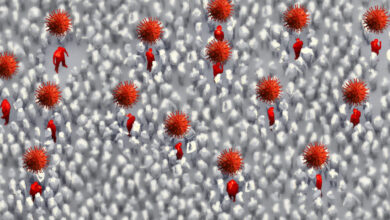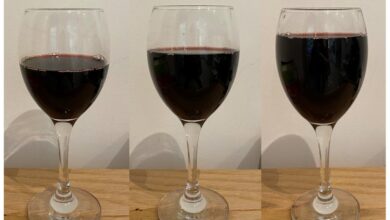As a Logic song took off, helpline saw more calls and fewer suicides


During the time {that a} tune whose title is the variety of a nationwide suicide prevention helpline topped charts, calls to the helpline elevated and suicides decreased, a brand new examine exhibits. The tune, “1-800-273-8255,” depicts a fictitious trade between somebody expressing suicidal considering and an operator of the Nationwide Suicide Prevention Lifeline who counsels an individual and in the end modifications that individual’s thoughts.
Leaders of the Lifeline and researchers who examine suicide and media co-authored the examine, which was published on Monday in the British Medical Journal. They discovered that three main occasions — the tune’s launch, the 2017 MTV Video Music Awards, and the 2018 Grammy Awards — had been correlated with will increase in calls to the helpline and, total, a big discount in suicides.
Josh Dominguez, 22, of California, mentioned he was one of many individuals represented in that statistic. A longtime fan of Logic, the artist behind the tune, Dominguez mentioned he listened to “1-800-273-8255” shortly after its launch in April 2017, when he was coping with a current breakup and the feelings of graduating from highschool.
commercial
“I felt like I used to be at my lowest level, and it led me to name the quantity as a result of I felt so misplaced,” he mentioned. Chatting with one of many name operators on the Nationwide Suicide Prevention Lifeline was therapeutic, he mentioned, and years later, he wrote a notice to Logic telling him that his music saved his life.
Logic spoke in an interview with Genius about how interactions along with his followers impressed him to put in writing “1-800-273-8255.”
commercial
“They’ve mentioned issues like, ‘Yo, your music has saved my life,’” Logic mentioned. “In my thoughts, I used to be like, ‘Man I wasn’t even attempting to save lots of no person’s life. After which it hit me, the facility that I’ve as an artist with a voice. I wasn’t even attempting to save lots of your life — now what may occur if I truly did?”
The end result was a chart-topping tune that featured musical artists Alessia Cara and Khalid and, researchers mentioned, supplied probably the most rigorous exams of the “Papageno impact.” Named for a scene within the Mozart opera “The Magic Flute” by which the place a personality is persuaded to not kill himself, the phenomenon has been theorized to happen when despairing people eat media about constructive coping and methods of overcoming suicidality, mentioned John Draper, the manager director of the Nationwide Suicide Prevention Lifeline and a co-author of the examine. He added that the tune’s true worth might have been obscured, since its recognition peaked concurrently that of the Netflix present “13 Causes Why” — which was associated with a spike in youth suicides.
“There’s nonetheless a substantial amount of energy and media round selling tales of hope and restoration, nevertheless it’s additionally a reminder that there’s a tide that now we have to swim towards,” Draper mentioned. “Most tales proceed to be about suicides and hopelessness, and casting that shadow constantly within the media over individuals in despair can truly make a darkish night time darker.”
Draper mentioned that he seen a spike in calls to the Nationwide Suicide Prevention Lifeline after Logic carried out “1-800-273-8255” on the Video Music Awards and Grammys and shared the decision information along with his co-author Thomas Niederkrotenthaler, affiliate professor of public well being and analysis group lead for suicide prevention on the Medical College of Vienna, to find out the tune’s statistical affect. The examine’s authors carried out a regression evaluation that estimated the impact of the tune’s in style moments on the variety of calls to the helpline and variety of suicides, whereas accounting for unfavorable results as a consequence of “13 Causes Why” and movie star suicides. They discovered that the mix of the tune’s launch, and its dwell performances on the 2017 MTV Video Music Awards and the 2018 Grammy Awards, had been related to a big improve in calls and reduce in suicides.
Alexandra Pitman, an affiliate professor on the whole grownup psychiatry at College School London, who was not concerned within the analysis however wrote an accompanying editorial, mentioned that dissecting the tune may show helpful for the creators of psychological well being public service bulletins, as a result of there’s not understanding of assist individuals overcome suicidality. Along with the tune itself, she mentioned that visuals — such because the music video depicting a closeted homosexual younger grownup and the award present performances that featured volunteers sporting shirts with the helpline quantity on them — had been “fairly highly effective.”
The way in which the tune is written might have additionally contributed to the success of its message, mentioned Cliff Notez, a Boston-based musician and professor of songwriting at Berklee School of Music. By naming the tune after the Nationwide Suicide Prevention Lifeline however not referencing it within the lyrics, listeners are inspired to take motion by looking out or calling the quantity. The tune, Notez added, was meant for a pop viewers and meant to be sung in stadiums.
“Whenever you take heed to the tune, at face worth, it doesn’t sound like a tune about about suicide. It’s sort of hilarious, like one of many lyrics is like, ‘Who can relate? Woo!’” he mentioned.
Importantly, there’s a protracted custom of referencing psychological well being struggles and suicide in hip-hop music, from work by Grandmaster Flash to Child Cudi. Logic, a biracial artist who makes music impressed by hip-hop and pop, successfully used the tune to proceed that dialog, though “1-800-273-8255” has been criticized as pandering and corny.
“There’s a psychological well being disaster throughout the African American neighborhood, which fits unstated due to many various causes, whether or not it’s mistrust for the well being care system on the whole, or stigma across the concept of psychological sickness,” Notez mentioned. “The tune might suck, however is that a very powerful a part of what’s occurring right here? No, we’re attempting to get one thing greater out right here, which isn’t talked about.”
When you or somebody you recognize is contemplating suicide, contact the Nationwide Suicide Prevention Lifeline at 1-800-273-8255 (Español: 1-888-628-9454; deaf and laborious of listening to: 1-800-799-4889) or the Disaster Textual content Line by texting HOME to 741741.




